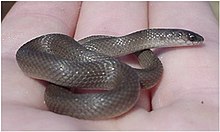Virginia (snake)

| Virginia | |
|---|---|
 | |
| Virginia striatula, rough earth snake | |
| Scientific classification | |
| Domain: | Eukaryota |
| Kingdom: | Animalia |
| Phylum: | Chordata |
| Class: | Reptilia |
| Order: | Squamata |
| Suborder: | Serpentes |
| Family: | Colubridae |
| Subfamily: | Natricinae |
| Genus: | Virginia Baird & Girard, 1853[1] |
| Synonyms[2] | |
| |
Virginia is a genus of small, terrestrial, colubrid snakes, native to the United States. They are commonly referred to as earth snakes.
Species
[edit]- Virginia striatula (Linnaeus, 1766) - rough earth snake (now placed by many into the genus Haldea)
- Virginia valeriae Baird & Girard, 1853 - smooth earth snake
Geographic range
[edit]- Virginia striatula - southeastern United States, from Oklahoma and Texas to North Carolina and Florida.
- Virginia valeriae - eastern half of the United States, from Iowa and Texas to Pennsylvania and Florida.
Ranges overlap; it is unknown if hybridization occurs.
Description
[edit]Virginia species are small snakes, rarely exceeding 10 inches (25 cm) in total length (including tail). They are normally a uniform brown color, with a lighter colored underside. Differentiating species can be difficult, but V. valeriae has smooth scales, whereas V. striatula has keeled scales.
Habitat
[edit]Virginia species are fossorial, spending the vast majority of their time buried in loose soil, under rotting logs, or in leaf litter.
Diet
[edit]They eat earthworms and soft bodied arthropods. They themselves are a food source for other species of snake, like the coral snake.
References
[edit]- ^ Boulenger, G.A. 1894. Catalogue of the Snakes in the British Museum (Natural History), Volume II., Containing the Conclusion of the Colubridæ Aglyphæ. Trustees of the British Museum (Natural History). (Taylor and Francis, Printers). London. xi + 382 pp. + Plates I.- XX. (Virginia, pp. 288-289.)
- ^ Wright, A.H., and A.A. Wright. 1957. Handbook of Snakes of the United States and Canada. Comstock. Ithaca and London. 1,105 pp. (in 2 volumes) (Genus Haldea, p. 286.)
Further reading
[edit]- Baird, S.F., and C.F. Girard. 1853. Catalogue of North American Reptiles in the Museum of the Smithsonian Institution. Part I.—Serpents. Smithsonian Institution. Washington, District of Columbia. xvi + 172 pp. (Genus Virginia, p. 127.)
- Blanchard, F.N. 1923. The Snakes of the Genus Virginia. Papers Mich. Acad. Sci. 3: 343–365, illustrations.
External links
[edit]- South Carolina Reptiles & Amphibians
- Snakes of Georgia & South Carolina
- Genus Virginia at The Reptile Database